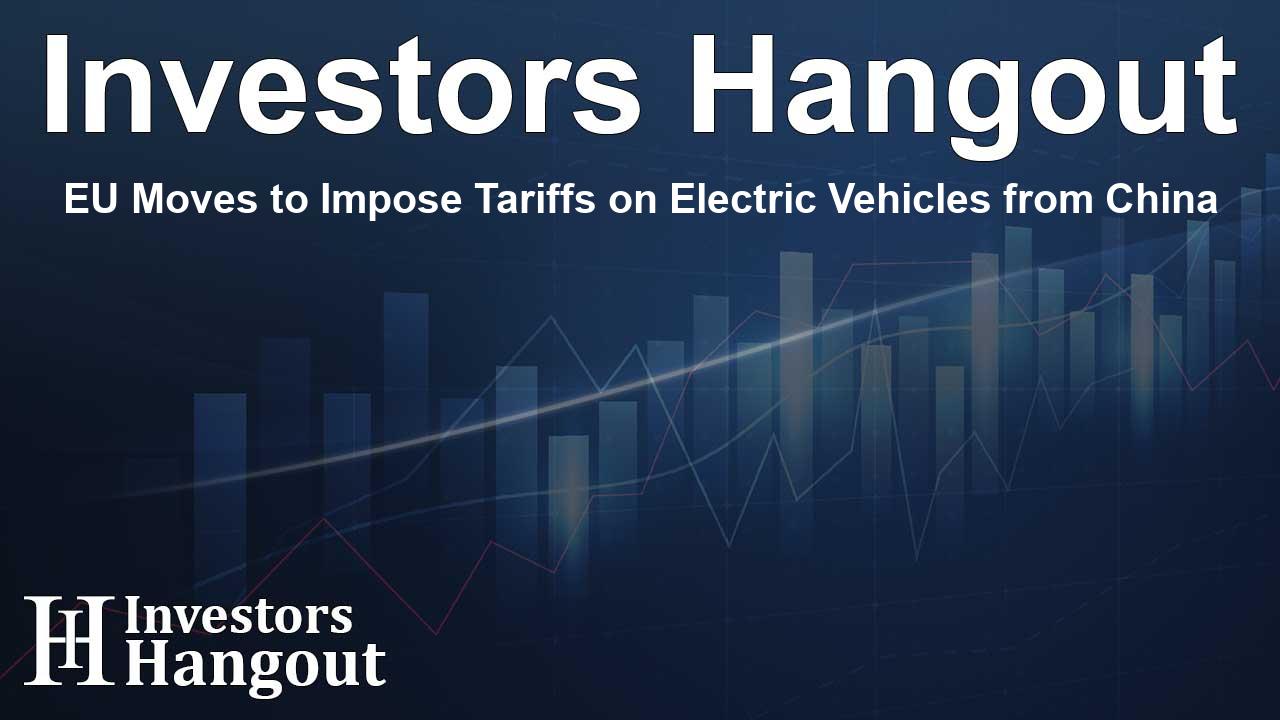EU Moves to Impose Tariffs on Electric Vehicles from China

EU's Decision to Impose Tariffs on Chinese Electric Vehicles
The European Commission has garnered significant backing from its member states to implement tariffs as high as 45% on electric vehicle imports originating from China. This decision underscores the EU's firm stance amid pertinent discussions on international trade.
Division Among EU Members
Despite the backing, the EU is witnessing a rift among its members regarding the tariffs. Notably, Germany, a powerhouse in the automobile industry, has voiced its opposition to the proposal. A recent vote revealed that while 10 member states supported the tariffs, Germany and four other countries were against it, leaving 12 nations abstaining from the vote.
Impact on Carmakers
The imposition of these tariffs could result in substantial additional costs for car manufacturers wishing to enter the European market. The tariffs are slated to be enforced for five years beginning November, which may significantly affect pricing and supply chains for companies importing vehicles from China.
Justification for the Tariffs
The European Commission justifies these measures by claiming the tariffs are necessary to counteract what it regards as unfair trade practices from China. Such practices, the Commission argues, pose a considerable risk to the European electric vehicle industry.
Potential Negotiations with China
Despite this firm step forward regarding tariffs, the Commission has indicated a willingness to continue dialogue with Beijing. Reports suggest that one potential avenue for compromise could be setting minimum sales prices for the affected vehicles, aiming to balance the concerns of both parties.
Reactions from the China Chamber of Commerce
The China Chamber of Commerce to the EU expressed strong disappointment following the vote, stressing their dissatisfaction with the EU's shift towards protectionist trade measures. They have called upon the EU to reconsider its strategy, suggesting that further deliberations and dialogue are better avenues to resolve trade disputes.
Industry Reactions
Prominent automotive firms in Germany, including Volkswagen, BMW, and Mercedes-Benz, have criticized the EU Commission's decision, urging for negotiations with China to reach a more amicable resolution. They emphasize the need for constructive dialogue to ensure that the automotive sector thrives under fair trade conditions.
Meanwhile, France’s PFA car association has stated its support for free trade measures, insisting that such frameworks should remain fair and equitable for all participants in the industry. The overarching sentiment among these automotive leaders is a preference for negotiation over imposed tariffs.
Conclusion
As the European Union moves forward with its proposed tariffs on Chinese electric vehicles, the implications for international trade and the automobile market are significant. The divergence of opinions within the bloc showcases the complexity of forging a cohesive trade policy while addressing global competition and economic fairness. Ongoing dialogues with China could pave the way for possible adjustments to these tariffs or collaborative solutions that benefit all parties involved.
Frequently Asked Questions
What tariffs is the EU planning to impose on Chinese EVs?
The EU plans to impose tariffs up to 45% on electric vehicles imported from China.
Why is Germany against these tariffs?
Germany, a major car manufacturer, opposes the tariffs due to potential increased costs for automotive companies and the impact on the market.
How long will the tariffs be in effect?
The tariffs are set to last for five years, starting in November.
Are there any negotiations planned with China regarding these tariffs?
Yes, the European Commission has indicated it will continue discussions with China to explore potential compromises.
What is the position of the automotive industry regarding these tariffs?
The automotive industry, especially in Germany, has expressed concern and is urging the EU to seek negotiated solutions rather than impose tariffs.
About Investors Hangout
Investors Hangout is a leading online stock forum for financial discussion and learning, offering a wide range of free tools and resources. It draws in traders of all levels, who exchange market knowledge, investigate trading tactics, and keep an eye on industry developments in real time. Featuring financial articles, stock message boards, quotes, charts, company profiles, and live news updates. Through cooperative learning and a wealth of informational resources, it helps users from novices creating their first portfolios to experts honing their techniques. Join Investors Hangout today: https://investorshangout.com/
Disclaimer: The content of this article is solely for general informational purposes only; it does not represent legal, financial, or investment advice. Investors Hangout does not offer financial advice; the author is not a licensed financial advisor. Consult a qualified advisor before making any financial or investment decisions based on this article. The author's interpretation of publicly available data shapes the opinions presented here; as a result, they should not be taken as advice to purchase, sell, or hold any securities mentioned or any other investments. The author does not guarantee the accuracy, completeness, or timeliness of any material, providing it "as is." Information and market conditions may change; past performance is not indicative of future outcomes. If any of the material offered here is inaccurate, please contact us for corrections.